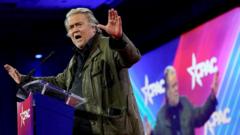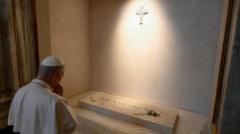In March 2013, the election of Pope Francis marked a pivotal transition for the Catholic Church, focusing on its role in the global south and addressing critical internal challenges.
Pope Francis’ Historic Election: A Turning Point for Global Catholicism

Pope Francis’ Historic Election: A Turning Point for Global Catholicism
Reflecting on the significance of Pope Francis' 2013 selection and its impact on the Catholic Church.
In March 2013, the Roman Catholic Church witnessed a significant evolution with the election of Pope Francis, the first pontiff from South America. Cardinal Jorge Mario Bergoglio's selection as the 266th pope emphasized the church’s shift towards the global south, where the majority of Catholics reside, sending a clear signal about its future direction.
At 76, Bergoglio's ascension as the first non-European leader of the Church in over a millennium, as well as the first Jesuit pope, reflected a commitment to inclusivity and humility. His background, born to Italian immigrants and serving as the archbishop of Buenos Aires, was marked by advocacy for the marginalized and a simple lifestyle, which resonated with many in the Catholic community seeking reform.
Upon assuming the papacy, Pope Francis confronted a variety of challenges within the Church, including a notable shortage of priests, competition from evangelical denominations, the fallout from sexual abuse scandals eroding moral authority, and governance challenges within the Vatican itself.
The conclave that led to his election unfolded after a week of rigorous discussions regarding the pressing issues the Church faced, uncovering the cardinals’ desire for a leader who could guide them through tumultuous times. Cardinal Christoph Schönborn of Vienna encapsulated the essence of this call when he noted that the papal role differs significantly from a corporate one, emphasizing a spiritual leadership crucial for a community of believers.
Rachel Donadio, who served as the Rome bureau chief for key news outlets between 2008 and 2013, encapsulated the critical sentiment of this momentous occasion. Pope Francis’ election was not merely a change of leadership; it represented a transformative vision aimed at revitalizing the Catholic Church in an increasingly complex world.




















